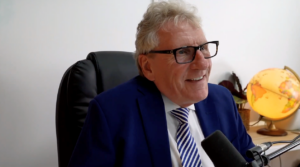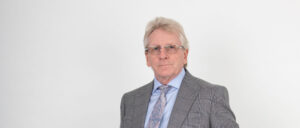People often ask me about my career, and while it’s always nice to reminisce, what I really want to do is be able to help other people make good decisions for themselves and their businesses – that relate entirely to the business world we are in today.
In at the deep end with Hayden Smith
In 1990, I was working for Ramport Scaffolding and though, along with the owner, that there was a good opportunity to open up a depot in Rainham, Essex and I had great plans for my future. And then, surprisingly to me, a really deep recession hit and, like a lot of other people in the construction industry, I was made redundant.
Anyone who’s experienced this knows how terrible it can be – I was made redundant just a month before Christmas, and my wife and I had absolutely nothing, having only been married for a couple of years. Looking back, of course, it was the best thing that ever happened to me because it forced me to go out looking for new opportunities – and I found one.
Just before Christmas, I had an interview with Hayden Smith. I started to tell him all about my work history, but typically, he interrupted me and said: “That’s all good, but what can you do for me?”
I must have said something that sparked his interest, though, and he offered me a role with Sevenhurst Scaffolding – a company he had taken over. and he sent me a handwritten offer letter. Dated December 14th, Hayden added a P.S. ‘Merry Christmas’ – and that’s one of the best presents my wife and I have ever received. It also says a lot about the man – although he was tough, he really cared about the people who worked for him.
So I took on the job of breathing life into a business that was effectively dead – not even on life support! When I joined at the start of 1991, there was only me – no other staff. I had a portacabin, a three-tonne lorry, a phone, a car and some materials. I set up in the corner of the TRAD yard in Bromley-by-Bow and got on the phone to try and get some enquiries.
In the first month of trading, I invoiced just £850. I did pretty much everything – all the lead generation, surveying the contracts, putting scaffolding teams together and more. And because we were working in the middle of a recession, it was incredibly hard to start pulling that business in.
I hated cold calling!
Let me say here that I’m not a salesman. I didn’t like using the phone – and I hated sitting there staring at the phone in front of me. I didn’t want to cold call people and try to persuade them to give me enquiries. But I had no option, so I looked at local, city and west end construction sites, made a note of the names and numbers of contractors on the site hoardings and then went and sat on the phone until I got somewhere with them.
It’s a bit like going to the gym, really. You know you should go, but you really don’t want to. By the time you’ve forced yourself to go and do a workout though, you are glad you went and you feel better for it – that’s exactly what it was like with the cold calling. Getting started was the hardest part, but I never regretted it.
But when times are tough, you need to adapt to the situation you’re in, work with what’s in front of you – believe that you can be a winner, when so many others are not.
So what got me that work? It was persistence, persistence, persistence. I wouldn’t let up until the contact gave me the opportunity to quote, and then when I quoted, I made sure the price was competitive – and that we could deliver a great service, quickly. When I got a job, I did what I said I would do. So we got a reputation for being honest, straight and delivering the job – and a first class service.
My two top rules for business
I also developed a business model that I have used all the way through my commercial life:
- Always be involved in at least four sectors, to protect the business by spreading your activity
- Never have more than 10% of your revenue with any one client
So, I needed to expand my activity to protect the business. I identified two additional sectors where I thought I could get a good foothold in the market and bring in a good margin – the aircraft maintenance and industrial sectors.
In the aircraft maintenance sector, we eventually became the largest supplier of temporary docking, working with British Airways, British Aerospace and across the country’s largest airports, including Heathrow, Stanstead and Manchester. Being able to build large mobile docking stations in system scaffold helped airlines and operators to keep their costs down when they were going through a period of restrictions on capital expenditure on permanent docks. Some of the mobile tail structures we built were in excess of 70ft high!
In the industrial sector, we worked with the Wellcome Trust, Tate & Lyle refineries and at nuclear facilities like Dungeness and Bradwell power stations. I found that this was great work to be part of my client mix because these businesses had set dates for payment, which were never missed. So while the margins were much tighter than those in the construction sector, these regular payments really helped me to manage the cashflow in the business.
System scaffolding and a TRAD merger
In order to work in these sectors – particularly aircraft maintenance – we invested in a ring system, which was one of the best ring systems on the market at the time. It allowed us to move into different markets and offer a diverse range of services and applications.
By 1996, we had renamed Sevenhurst Scaffolding as TRAD Scaffolding Systems and, with the introduction of system scaffolding and an increased demand for business, I came up with a business plan to merge TRAD Scaffolding Systems which was now turning over around £4.5m a year, with the existing TRAD business, as both entities were about the same size by then. Hayden agreed to this proposal and that’s when I become MD of the combined business.
Of course, I didn’t always get things right. I still don’t! But I’ve always been honest with clients and always put things right if I get then wrong – and that’s something I’ve always advised my teams to do too. That helps to bring trust into the business and that’s important for building your reputation.
And of course, with the merger, we also started to focus more on the branding we were using. We wanted our structures to be instantly recognisable, and we wanted everyone to know how much work we were doing.
That’s why we chose bold colours – orange and yellow for our logo. So all our sign boards, which were also larger than standard, were in these colours. As you may remember, people didn’t even need to see the name – just seeing the colours on every piece of equipment told people they were supplied by TRAD. And, as a recent post here on LinkedIn showed, that branding still resonates today.
What advice can I pass on?
So what are the takeaways from my experience for your business or your career?
Don’t give up – life throws difficult stuff at you. I’ve certainly had a lot of things to manage in my time. But look at these as opportunities to do something different, and grab that opportunity when it comes your way. Always say ‘yes’ rather than ‘no’.
Adapt to your circumstances – this is one of the keys to success, I think. If you rigidly stick to ‘how things have always been done’ you’ll miss the chance to spot new openings. If something’s not working, change it.
Promise what you can deliver, and deliver it – only over-promise if you can deliver! And always be completely upfront with your customers. If something’s gone wrong, admit it and put it right. There’s nothing more important that building up that trust.
Invest in branding and invest in your image – It doesn’t matter how big or small the company is, you should invest in creating the best image you can. There’s no reason why equipment can’t be painted, why your vehicle can’t be clean, and your jobs can’t be done tidily. It’s just as important that your teams have decent workwear. All this can be achieved by any company no matter what your size.
Work hard – I’m the first person to say that I’ve probably put in too many hours over my working life. But for me, it has paid off. I would never say that I have any particular talents, but I was always prepared to work really hard to get where I wanted to be. Hard work overtakes talent in isolation all day long.
Never be too busy for people – not only did Hayden Smith change the direction of my work life; he did it by taking the time to write to me personally before Christmas, so I didn’t have to worry. That was a real lesson to me, and I have always taken the time to respond to people and treat them with respect.
And finally, here’s a mystery from my early days at Sevenhurst. I had the only set of keys to my portakabin office and I locked up religiously every night. One morning, I came into the yard, unlocked the door and there, sitting in the middle of my desk, was a table tennis ball. To this day, I have no idea where it came from and how it got there. But I took it as a good luck symbol and I’ve had it ever since – and here’s the proof!





